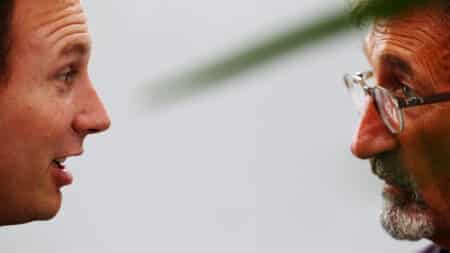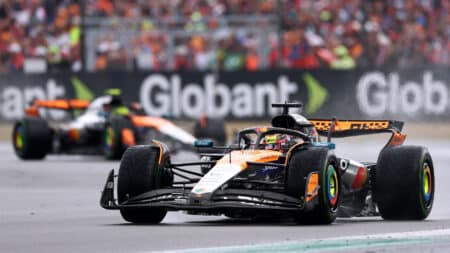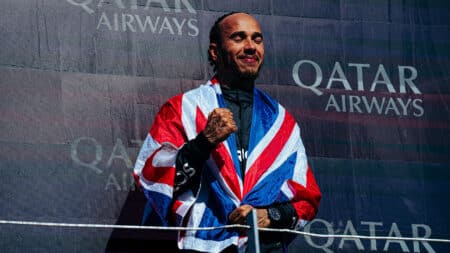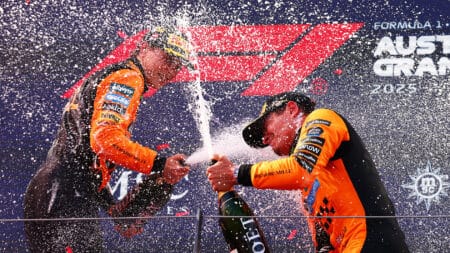
Horner's departure shows age of the maverick F1 boss is over
Christian Horner has now left Red Bull, the last of a certain breed of F1 team principal
Had history been a benign guide rather than a harsh teacher, Kris Meeke might have followed the wheel tracks of fellow Northern Irishman Paddy Hopkirk and won a Monte Carlo Rally by now.
In a red Mini.
But a few weeks before its 2012 hosting, he was instead dramatically benched by Prodrive for financial reasons.

Colin McRae had long ago seen something in this graduate son of a noted rally engineer from Dungannon and taken him under his wing.
Meeke later won the 2009 Intercontinental Rally Challenge with Peugeot and finished third the following year.
At which point Prodrive boss David Richards – as he had for future world champions McRae and Richard Burns in the early 1990s – gave British driving talent a chance at the highest level.
Meeke’s fifth place on Catalunya’s tarmac – a performance that included the fastest Power Stage time – and fourth – it might have been third but for a spin on the Power Stage – on the Rally GB at the close of 2011 were clear indicators that Richards’ radar was still calibrated correctly.
Unfortunately, 2012 would be one big blip for Meeke. It was confirmed not long after the Monte that he would play no part in Mini’s floundering WRC effort.

2013 was marginally better, although both his WRC outings with Citroën, in Finland and Australia, concluded in retirements.
Many feared that might be that.
But Sébastien Loeb’s switch to circuits helped provide Meeke with another chance: a full campaign with Citroën in 2014.
Four third places – Monte Carlo, Argentina, Finland and France – for a manufacturer overtaken by VW in the pecking order was a solid performance by a man who still wore a haunted look from time to time.
Disappointing results early this year – 10th on the Monte, seventh in Sweden and 16th in Mexico – added to that pressure…
… and then he won in Argentina – the first WRC victory for a British driver since mentor McRae’s success on the 2002 Safari Rally with Ford.
It’s odd how you can come to take things for granted. Britain’s success in top-line rallying was for year after year upon year limited to its well-organised teams and co-drivers. Its drivers – bar Roger ‘Cossack’ Clark on the 1976 Lombard RAC – drew a WRC blank until ‘Mad Dog’ began winning in 1993.

And then Burns – a rapier thrust to the Scot’s swashbuckling cutlass – joined in and suddenly British-driver WRC 1-2s were not uncommon.
It’s hard to believe that both men have now departed us – and easy to understand why Meeke should dedicate his and Irish co-driver Paul Nagle’s victory to McRae.
It’s too early to say for sure, but Welshman Elfyn Evans’ third place in Argentina, his Ford Fiesta co-driven by Daniel Barritt, gives hope that Britain is again on the cusp of a rallying boom.
Not bad for a country that this year canned its national championship for the first time since its 1958 inception. (The 2001 cancellation was due to foot and mouth.)
The series’ most recent iteration had become virtually a single-make championship contested by youngsters with an eye on an international future: worthy – but lacking the variety necessary for the sport to thrive at its grass roots.

Reigning (but not defending) British Rally Champion Daniel McKenna
There was a time during the 1970s and 1980s when the British Open arguably held its regulars back: its ‘WRC Lite’ status and resultant star-topped entries keeping a lid, artificial or otherwise, on British ambition and expectation.
But during the era in which closed-road special stages replaced the open-road sections and selectives of the 1960s, it provided still the links from Hopkirk to McRae. Men like Andrew Cowan and Tony Pond, Russell Brookes and Jimmy McRae were the grit in the oyster.
British WRC success then was limited in the main to the RAC: Brookes scored a podium hat trick from 1977-79 and his perennial rival McRae was third in 1983 and ’87. And Pond’s legion of fans reduced Pickering to gridlock as they urged him to third in 1985 in the MG Metro 6R4.
But there were also a few overseas ‘pearls’.
Some professionals reckoned that the Safari Rally’s route had gone soft in 1976. They hadn’t reckoned with the first night’s thunderstorms that caused flash floods and left the rear half of the field stranded on the ‘far shore’.
Lancia had entered three Stratos HFs, but only that of local ‘import’ Vic Preston Jr reached the finish: 12th, after an array of mechanical problems.

Waldegård navigates the waters of Kenya
All the Opel Kadett GT/Es bar Walter Röhrl’s – his was sideswiped by a township taxi driver – suffered transmission problems, and the Peugeot 504 V6 Coupés of Hannu Mikkola and Timo Mäkinen retired because of overheating and a raging river respectively.
This left the remarkably reliable 1.6-litre Colt Lancers to finish 1-2-3. Kenyans Joginder Singh – his third victory on the event – and Robin Ulyate drove the first two; Scotland’s Cowan drove the third.
It was the latter’s co-driver Johnstone Syer, however, who grabbed the British headlines. Disembarking when stuck in a mudhole, he was hit by another competing car and suffered broken ribs yet soaked up the pain and punishment to complete the event.
The 1977 Acropolis Rally was nothing but rough. Not that Ari Vatanen knew much about it. His works Ford Escort slid on another’s oil slick and struck a tree during the short tarmac stage used to finalise the running order of the event proper.
Luckily, his team-mates Björn Waldegård and Clark – often ‘trapped’ in his role of British Championship icon – drove with élan and accuracy to secure a 1-2, the thinning Swede’s six-minute winning margin dictated more by punctures than any noticeable superiority over the luxuriantly coiffed Englishman and his co-driver Jim Porter.

The latter duo was at it again a few months later and finished third behind the Fiat 131 Abarths of Timo Salonen and Simo Lampinen on the Critérium du Québec.
The Italian cars held an advantage on the metalled sections due to their slick tyres – though the organisers had forbade their use they had neglected to specify a penalty – but Clark’s team-mate Vatanen was leading during the last night on the slimy logging roads north of Montréal when he suffered ignition failure.
Cowan, too, was at it again, this time in the Ivory Coast for the 1979 Bandama Rally: events had better names back then.
This December contest would decide the inaugural world drivers’ championship in favour of Waldegård or Mikkola. Yet it was their British Mercedes-Benz 450SLC team-mate, co-driven by Klaus Kaiser – yes, he wasn’t British – who set the pace on the first leg and continued to pull away on the second until told to yield to the title’s aspirants.
He eventually finished third, ahead of Preston Jr but behind winner Mikkola and world champion – by a single point – Waldegård in a Merc 1-2-3-4.
Finally, a Datsun Violet on slicks is a rally image rarely conjured with yet the Japanese manufacturer sent three to the 1981 Tour de Corse, a thinly disguised road race that required a press-on attitude even between stages if penalties were to be avoided.
The rally was won by the privateer Stratos of Bernard Darniche after the pace-setting Ferrari 308GTB of Jean-Claude Andruet suffered fuel pump failure.
The leading Violet of Pond and co-driver Ian Grindrod finished third, almost 20 minutes behind the Lancia supercar. Crud in the fuel tank a constant worry for the British pair, they were only three minutes in arrears of Guy Fréquelin’s Talbot Sunbeam Lotus: a fairer comparison of performance.
Unlike McRae, Burns, and now Meeke, the above never won away in the WRC – indeed only Clark won at home – but they offered less insular British fans something to believe in, something to cling to.
Meeke likely won’t inherit the WRC – he’s already a (youthful) 35, and those VWs are too fast and (usually) too reliable – but undoubtedly now he will be the next British link, as well as giving the revamped BRC of 2016 a focus and therefore a boost.

Christian Horner has now left Red Bull, the last of a certain breed of F1 team principal

Was Oscar Piastri the real winner in the long run after Silverstone? asks James Elson

Lewis Hamilton hadn't won in almost three years – and then produced a sensational victory at Silverstone 2024. James Elson explains why it was his best ever

Describing this year's championship race as a 'battle' might be slightly over-egging it, writes James Elson